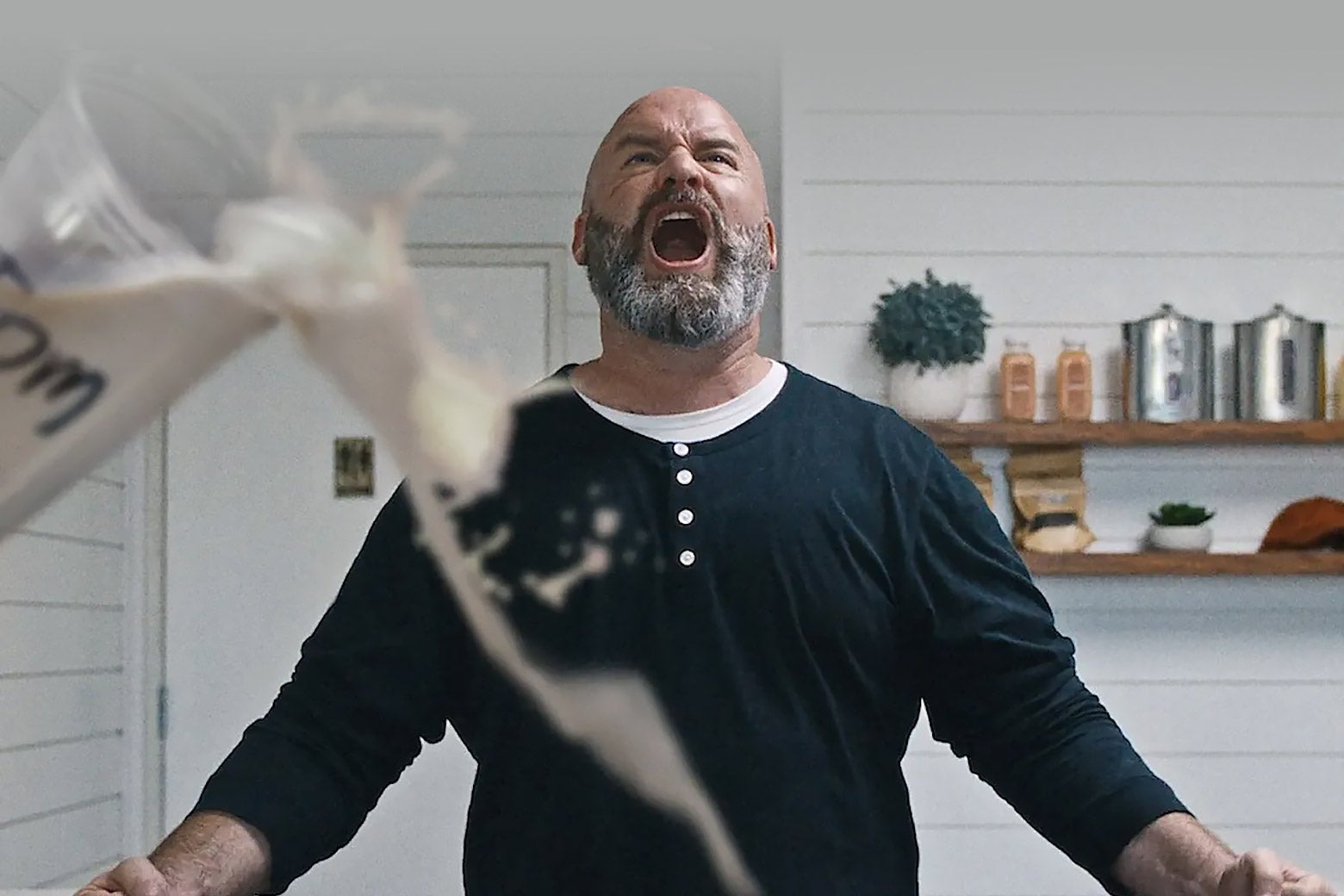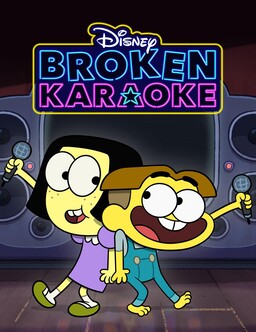
Within the first five minutes of the first episode of Tom Segura’s brand-new Netflix sketch comedy series Bad Thoughts, a character played by the stand-up comic shits his pants. He does so loudly, and messily, leaving a big wet stain visible to all the world. Then, Segura’s character drops his pants entirely, revealing that his butt and his legs are completely covered in shit, and proceeds to walk around soiled and half-naked for the rest of the sketch. It’s not very funny, but at least it sets a tone.
The comedian maintains that tone throughout all six episodes of Bad Thoughts, a show that cares less about making you laugh than about making you gasp with disbelief that Segura went there.The sketches are designed to shock, first and foremost, and only incidentally to entertain. In one sketch, a straight guy at a work retreat repeatedly blurts out that he “slept like a homo” the night before. In another, a Larry David–esque setup about a barista botching a coffee order ends with Segura brutally murdering three people in gratuitous revenge. There’s a running joke about an immersive virtual-reality game called Aliens Fuck Humans, in which aliens do exactly that. In the final sketch of the final episode, Segura uses a rusty hatchet to hack off his own penis, which has grown to roughly the size of a boa constrictor.
In Bad Thoughts, the provocation is the point, and it is one that will be familiar to anyone who knows Segura from his stand-up and podcasting work. There, he has carved out a niche as an often transgressive comedian, one who is unafraid to riff on topics and viewpoints that are supposed to be off-limits to a bald, bearded middle-aged straight guy. Segura gets away with these transgressions in part because he can be very funny: His material is generally composed and delivered with a skill, fluidity, and self-awareness that most ostensibly “edgy” comedians lack.
But he gets away with it also because of the company he keeps. A close friend and frequent podcast guest of Joe Rogan’s who moved to Austin, Texas, on the heels of Rogan’s own relocation there, Segura sits near the center of a circle of comedians and cultural commentators who portray themselves as the antidote to the suppressive strains of scolding wokeism that have allegedly infected mainstream culture and politics. These people all promote each other’s books and shows and podcasts and specials; they reinforce each other’s biases and presumptions with their constant commingling.
Although Segura’s comedy is not typically overtly political, his podcast work is a different story. The reporter Seth Simons has argued that Segura and his wife and podcasting partner, the comedian Christina Pazsitzky, “are obsessed with trans people. This obsession most commonly takes the form of casually dismissive jokes about pronouns and nonbinary gender identities, but that’s the tip of the iceberg. Often they’ll play clips of young and/or trans people explaining various gender-related concepts, then mock those people.” In 2021 Segura and Pazsitzky hosted the unapologetically misogynistic influencer Andrew Tate, who has since been indicted on rape and human trafficking charges. In the podcast episode, in Simons’ telling, the two came across as “unabashed fans who embraced some of his most disturbing statements. When Tate argued that women should be submissive to men, Segura said he was ‘speaking the gospel.’ ”
In a 2023 interview with Deadline, though, Segura claimed that in the Tate interview, he and Pazsitzky had merely been trolling someone who was himself a troll. “The origin is that we would play clips of this guy saying ridiculous shit and make fun of him,” Segura said. “It was clear to me that this was somebody who’s very self-aware … and I didn’t know that when he came in. And then it was clear that he flipped a switch when the mics and everything rolled, which I appreciate. I’m like, ‘This guy knows he’s entertaining people and he’s provoking them.’ ”
So is Segura an authentic jackass, or is he mostly just trolling other people who are jackasses? Maybe it’s a distinction without a difference. Segura’s embrace of willful provocation has made him famous in the wide world of alt-right-curious Rogan bros who wish that they too could say terrible things in public without fear of cancellation. Judging by the popularity of The Joe Rogan Experience and affiliated podcasts, there are a lot of those sorts of people out there—and, with Donald J. Trump now waging a war against wokeism from his perch in the White House, they’re starting to come out of the shadows.
While Netflix presumably greenlit Bad Thoughts well before Trump’s 2024 election victory was secure, the streamer surely knows that now is the ideal cultural moment for an aggressively impolitic sketch show like this one. After only one day in release, the series has already risen to No. 2 in Netflix’s Top 10. But the adeptness that suffuses Segura’s stand-up work is mostly absent from Bad Thoughts, which is the comedian’s first official foray into sketch comedy. The show isn’t exactly cut-off-your-own-dick terrible, but the overarching conceptual joke is that literally every single sketch is in bad taste—and the punch lines, if they exist, seem to come at the expense of some theoretical prudes who might find Segura’s material inappropriate. Welcome to sketch comedy in the backlash-to-wokeism era, when the fact that you’re not laughing means that you’re the problem.
This is not an article about Joe Rogan, but it’s difficult to talk about Segura’s career without also talking about Joe Rogan, who has helped him a lot along the way. Rogan, a stand-up comic who came to fame on the sitcom NewsRadio, then the reality show Fear Factor, now hosts one of the most well-known podcasts in the world: It was just named Spotify’s most popular podcast in the U.S. for the fourth year in a row. He often uses it to disseminate dumb alt-right talking points in a disingenuous, “just asking questions” manner and to blab for hours with the sorts of self-consciously heterodox commentators who spend too much time on the internet, are unduly obsessed with alleged liberal intolerance on college campuses, and might unironically use phrases like woke mind virus. Rogan’s podcast sit-down with Trump last October may well have helped swing the presidential election. Not bad for two former reality TV hosts!
Since 2019, I have written many thousands of words in this magazine explaining exactly how and why Joe Rogan sucks. By virtue of the transitive property, then, is it also the case that the people who have risen to fame via their affiliation with Rogan also suck? Though that might be true of many of the people in Rogan’s orbit—hello, Jordan Peterson!—I have never thought this to be true of Tom Segura. While I’m hardly a Segura completist, his material has always struck me as pretty well crafted, and his self-aware delivery makes it clear that in transgressing certain boundaries, the comedian is often also commenting on those boundaries.
Self-awareness can, of course, be a scoundrel’s refuge. A guy who winks knowingly while saying something offensive is often just using that knowing wink as a loophole that allows him to say something offensive. But in Segura’s case, his edgier material often seems to come at the expense of the sorts of people who might applaud him unironically. In Sledgehammer, his 2023 Netflix special, for instance, Segura wastes no time in challenging his audience’s boundaries. “Well, let me ask you guys something, man,” he says, right at the top. “Are they gonna keep taking our Confederate statues down, or what?”
The crowd’s initial laughter quickly transmutes into a confused silence, as if the audience members had reflexively cheered Segura’s punch line before their brains had had time to process what that punch line was. With a shrug and a double take mimicking their presumed confusion, Segura makes clear that their reaction was the punch line. “I’m just taking the temperature of the room; I don’t know who’s here, you know?” he says. (The way that Segura plays off other people’s reactions is part of why his material works in the context of stand-up sets. But it’s also a big part of why it doesn’t really work in Bad Thoughts: There’s nobody there to react to the comic’s provocative material, and thus to contextualize it as commentary rather than simple bad taste.)
While Segura still knows how to tell a joke, many of his fans seem to think that success has changed him for the worse. Since moving his own podcast mini-empire to Austin, they say, he has succumbed to self-congratulatory groupthink and lost the knowing edge that once set his material apart. A couple of years ago he went on an extended riff about how much he hates poor people, and his commitment to the bit—if indeed it was a bit—was alienating. (On the website of his podcast network, you can “exfoliate and scrub the dirt off your body the way poor people have for years” by buying a washcloth emblazoned with the phrase I’m poor.) You’d like to think that, on a meta level, the material about “the poors” is meant to be at the expense of the sorts of rich people who might say and think those things unironically, but is it? Segura’s success has made it more difficult to tell where his characters end and he himself begins.
That he now has a vast audience who will reflexively watch and listen to his shows, meanwhile, must make it tempting to pander to that built-in fan base by simply giving it the provocations that it expects, whether or not those provocations are funny. This lazy approach sits at the heart of my main problem with Bad Thoughts.
The mechanics of sketch comedy generally require you to keep on heightening the unexpected or unusual thing. The problem with Bad Thoughts is that it’s basically the same unusual thing every single time: Something rude is said or something gross happens. Though the specifics differ from sketch to sketch, the underlying themes remain constant. There’s no real variety to the material, which means that the material soon gets boring. Instead of serving the humor of a given sketch, the transgressiveness substitutes for humor—and shock value for its own sake only goes so far before it grows stale.
This problem is most prominent in the sketches that follow the standard beat-beat-beat-button structure. The “Slept like a homo” sketch that I mentioned above fails not because it’s offensive, although it is—it fails because being offensive is all that it’s going for. A sketch in which a school pageant takes several offensive turns is similarly dissatisfying. I’ve seen similar “foul-mouthed child” setups many times before, and Segura’s sketch suffers in comparison with those whose writers have used the archetype in service to their sketches’ premises, as opposed to using it as the entire premise.
Segura fares better with those sketches that stray from the standard rhythms of the format and veer into commentary. A long two-part sketch about a shallow country music star who has lost touch with his fans—Segura is clearly riffing on his long-running and largely one-sided “feud” with Garth Brooks, but the sketch is also germane to some things that Segura’s fans have said about him—drags on forever but ultimately succeeds because it heightens in a bizarre and unexpected direction when the musician decides to kidnap his fans and mine their shabby lives for “relatable” new material. The aforementioned Aliens Fuck Humans runner isn’t funny on its own per se, although it does feature Segura playing yet another character whose great wealth has turned him into a nasty weirdo. But the fact that the premise keeps on coming back over and over—that it deliberately overstays its welcome—ends up transforming the premise into a meta-commentary on its own unfunniness, which has the effect of rendering the sketch actually sort of funny: like the Sideshow Bob “rake” scene from The Simpsons, if the rakes had done something much worse than slap Sideshow Bob in the face.
The series’ best sketch is one that leans fully into this sort of self-awareness. In it, Segura, playing himself, is accosted on a plane by a fellow passenger: a little person who slams him for a stand-up routine in which he compared and contrasted the word midget with the N-word. The sketch heightens to the point that an emergency forces Segura into the cockpit to try to land the plane—only to find that the air-traffic controller on the other end of the headset also harbors a grudge about Segura’s stand-up material and is more than willing to let Segura’s plane crash in retaliation.
It’s hard to read that sketch as anything other than Segura’s sharp commentary on a “cancel culture” that allegedly seeks to destroy all those found guilty of the crime of politically incorrect speech. You don’t have to agree with Segura’s position on the matter to appreciate his effort to engage with it, and if Bad Thoughts had featured more sketches like that one, then it might have been something really special: provocation with a purpose. Instead, the laziness of most of the material here just makes Segura seem like a smug rich guy reveling in all that he can get away with: showing his ass to an audience that doesn’t need or expect anything more. Sometimes a shitty asshole is just a shitty asshole.
Get the best of culture
Get the best of movies, TV, books, music, and more.












